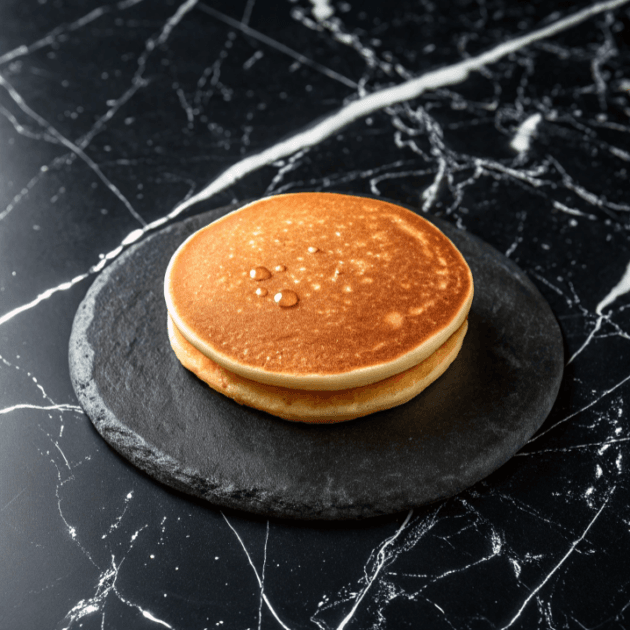Pancakes have long been a breakfast favorite, but is pancake healthy? Their nutritional value depends on ingredients, preparation, and toppings. This article breaks down their nutritional profile, explores health benefits, highlights risks, and suggests healthier alternatives to help you decide if pancakes are a healthy choice.
Nutritional Profile of Pancakes
Traditional pancakes made with white flour are often high in carbohydrates and low in fiber, making them a less-than-ideal choice for a balanced diet. While they provide quick energy due to their carbohydrate content, they lack essential nutrients and dietary fiber, which are crucial for digestive health and satiety.
Is pancake healthy? The answer depends on the ingredients and preparation methods. Pancakes made with whole-grain flours, healthy fats, and protein-rich additions like Greek yogurt or eggs can be a more nutritious option. Adding fruits, nuts, or seeds as toppings can further enhance their vitamin, mineral, and antioxidant content, making them a healthier choice compared to traditional recipes.
Nutritional Breakdown of Traditional Pancakes
According to the USDA Food Data Central, two medium pancakes (154g) with syrup and butter contain:
- Calories: 430.8
- Fat: 18.77g
- Sodium: 693.9mg
- Carbohydrates: 55.9g
- Sugars: 8.6g
- Protein: 8.64g
Key Nutritional Concerns with Traditional Pancakes
- High in Refined Carbohydrates – Pancakes made with white flour can lead to spikes in blood sugar, followed by energy crashes. This can contribute to weight gain and increase the risk of type 2 diabetes.
- Low Fiber Content – A lack of fiber means they are less filling, potentially leading to overeating. Fiber is essential for digestive health and blood sugar regulation.
- High Sugar Levels – Toppings like syrup and whipped cream add empty calories and excess sugar, which may increase the risk of obesity and heart disease.
- Sodium Content – Pancakes and their toppings can be high in sodium, which may contribute to high blood pressure.
A Healthier Alternative: Whole-Wheat Pancakes
For those looking for healthier pancake options, whole-wheat pancakes offer a better nutritional profile. They are richer in fiber, protein, and essential nutrients. A serving of 150g of whole-wheat pancakes contains:
- Calories: 348
- Fat: 15g
- Carbohydrates: 45g
- Fiber: 6g
- Protein: 12g
Benefits of Whole-Wheat Pancakes
- Higher Fiber Content – Promotes gut health, supports digestion, and increases satiety.
- Improved Protein Levels – Provides muscle-supporting protein, especially beneficial when combined with Greek yogurt or protein powder.
- Better Blood Sugar Control – Complex carbohydrates in whole grains are slow-digesting, preventing blood sugar spikes.
- Essential Vitamins and Minerals – Whole grains contain B vitamins, iron, magnesium, and zinc, which are essential for energy production and immune function.
Boosting Pancake Nutrition Further
- Add Protein Sources – Incorporate nut butters, chia seeds, or Greek yogurt for a protein-rich breakfast.
- Use Alternative Flours – Options like almond flour and oat flour provide healthy fats and extra fiber.
- Include Fruits and Seeds – Topping pancakes with blueberries, bananas, or flaxseeds boosts antioxidants and omega-3 fatty acids.
Protein-Packed Breakfast Options
For a more balanced start to your day, consider pairing pancakes with other nutritious meals. Check out Protein Baked Oatmeal for a high-protein alternative that complements pancakes and keeps you energized throughout the morning.
By making these simple swaps and adding nutrient-dense ingredients, pancakes can become a healthier breakfast choice that supports your fitness goals and overall well-being.
Potential Health Risks of Pancakes
1. High Sugar Content
Sugary syrups and toppings add empty calories, causing blood sugar spikes, weight gain, and increased risk of diabetes and tooth decay.
Tip: Use fresh fruits or natural sweeteners like honey in moderation.
2. Low Fiber
Pancakes made with refined flour lack fiber, leading to quick hunger, blood sugar fluctuations, and digestive issues like constipation.
Tip: Opt for whole-grain flours to boost fiber and satiety.
3. Trans Fats and Unhealthy Oils
Pre-mixed batters may contain partially hydrogenated oils, which raise bad cholesterol and increase heart disease risk.
Tip: Make pancakes from scratch with healthy oils like olive or coconut oil.
4. Excess Calories
Traditional pancakes with butter and syrup can exceed 1,000 calories, contributing to weight gain and nutrient imbalances.
Tip: Control portions and add Greek yogurt or fruits for healthier toppings.
5. High Sodium Levels
Store-bought mixes may have excess sodium, raising blood pressure and causing bloating.
Tip: Choose low-sodium options or prepare homemade batter.
6. Nutrient Deficiencies
Refined flours provide fewer vitamins and minerals, leading to energy crashes and potential deficiencies.
Tip: Use fortified flours or add nuts, seeds, and fruits for extra nutrients.
7. Allergies and Intolerances
Pancakes often contain gluten, dairy, or eggs, which can trigger allergies or intolerances.
Tip: Opt for gluten-free flours and dairy-free alternatives if needed.
8. Artificial Ingredients
Preservatives and artificial flavors in pre-made mixes may cause allergic reactions and digestive issues.
Tip: Stick to natural ingredients and homemade recipes to avoid additives.
Healthier Pancake Alternatives
1. Whole-Grain Pancakes
- Use whole-wheat, oat, or almond flour to increase fiber.
2. Protein Pancakes
- Add protein powder or nut butters for an extra protein boost.
3. Low-Carb and Keto Options
- Make pancakes with almond flour or coconut flour.
4. Healthier Toppings
- Replace syrups with fresh fruits, honey, or sugar-free spreads.
Tips for Making Pancakes Healthier
- Use Whole Grains – Choose whole-wheat flour to boost fiber.
- Reduce Sugar – Top with berries or low-sugar spreads.
- Smart Cooking – Cook with a non-stick pan to reduce butter or oil.
- Meal Prep Ideas – Pair pancakes with nutrient-packed sides like Cottage Cheese Cake for a balanced meal.
FAQs: Is pancake healthy?
1. Are pancakes unhealthy for breakfast?
Not always. Use whole grains and protein-rich ingredients to create balanced pancakes.
2. What is the healthiest flour for pancakes?
Whole-wheat flour, almond flour, and oat flour are nutrient-rich options.
3. Can pancakes be gluten-free?
Yes, substitute with almond flour or gluten-free pancake mixes.
4. Do pancakes help with weight loss?
Pancakes can support weight loss when prepared with low-calorie ingredients.
5. Are protein pancakes healthier?
Yes, protein-rich pancakes promote muscle repair and satiety.
Conclusion: Are Pancakes Worth Including in Your Diet?
Is pancake healthy? Pancakes can be part of a healthy diet if made with nutrient-dense ingredients. Options like whole-grain flours, protein boosters, and low-sugar toppings can make them a balanced breakfast.
Pair pancakes with nutritious sides like Protein Baked Oatmeal to create a wholesome meal.
By making small adjustments, you can enjoy this comfort food guilt-free while supporting your health goals. So, is pancake healthy? With the right ingredients and portion control, it certainly can be!

